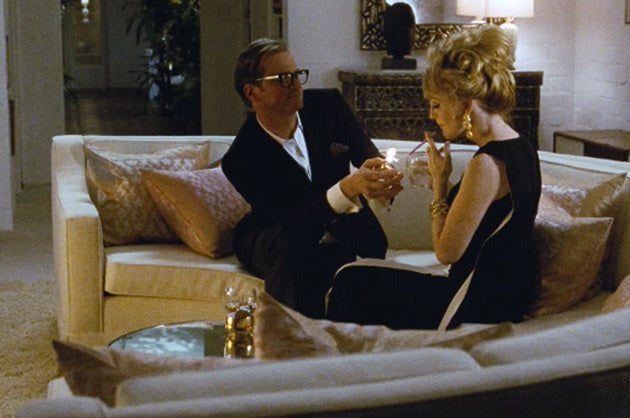
There will not be a better dressed film this year than A Single Man. Colin Firth stars as George Falconer, an English professor domiciled in Los Angeles, 1962, who is mourning the recent death of his lover in a car accident.
As deep as his grief runs, however, George will not neglect the crispness of his white shirt, the polish of his shoes, the crease in his trousers, and good job too: these accoutrements seem to be the only thing still holding him upright.
We should not be surprised by this sartorial immaculacy, for the film's writer-director, Tom Ford, is renowned as a fashion designer. Ford is adapting from Christopher Isherwood's 1964 novel of the same name, though he has given it his own narrative twist: George, paralysed by loss, has decided to put an end to his life, and the film focuses upon the day he has chosen to do it. Everything about George's personality is so considered and buttoned-up that when he digresses on society's persecuted "minorities" to his literature class you can almost see a gigantic question mark floating above the students' heads. They're baffled, but only one of them, a sweet-faced boy named Kenny (Nicholas Hoult), twigs that their professor has a secret. And the secret is that George is gay, that his heart is breaking in memory of his late love, Jim (Matthew Goode), and that there's nobody in the world he can pour it out to.
Not quite nobody. George, before he keeps his appointment with a loaded gun, stops by the home of his old friend Charley (Julianne Moore), a boozy Brit with whom he once had a sort of affair. She offers him gin and hugs, though it becomes clear during the evening that even she has gravely mistaken him: "If you weren't such a goddamn puff we could have been happy." Charley's kohl-black eyes and Mary Quant dress are as period-perfect as the Italian furniture, the bakelite telephones and the boxy Mercedes George drives, though there comes a point when the exquisite surface begins to obtrude. In a flashback scene between George and Jim, for instance, their bodies posed on a rocky cove, you tend to think of the ravishing monochrome of a Bruce Weber photograph, instead of noticing what's being said. One would have expected Tom Ford to make something this beautiful to look at – it's like a dream of Sixties elegance – but such perfection of detail can be distracting. It may have distracted the director: when George lays out the clothes he wants to be buried in, he sets a little note by his tie – "This is a Windsor knot" – but he's plainly forgetting how he'll look with a gunshot through his mouth. No open coffin there, I'm afraid.
A Single Man is measured, ironic, stylish and very slight. It would have been much slighter without the performance of Colin Firth holding it together. I have been utterly fed up with this actor in recent years, ploughing his narrow range between gruff and constipated, complaining that nobody has taken him seriously since the Darcy business. He hardly traverses the emotional spectrum here, either, emanating a very English air of resignation and regret as he prepares for his exit. But he does pull off one amazing scene when the phone rings and a stranger's voice is heard telling him of Jim's fatal accident. The camera locks on George's face as he listens, and while he tries to keep his voice level that face stages its own subtle drama of shock and collapse. Is it the stuff to merit an Oscar? I rather doubt it, but those moments may be the best work Firth has ever done on screen.
Subscribe to Independent Premium to bookmark this article
Want to bookmark your favourite articles and stories to read or reference later? Start your Independent Premium subscription today.

Join our commenting forum
Join thought-provoking conversations, follow other Independent readers and see their replies